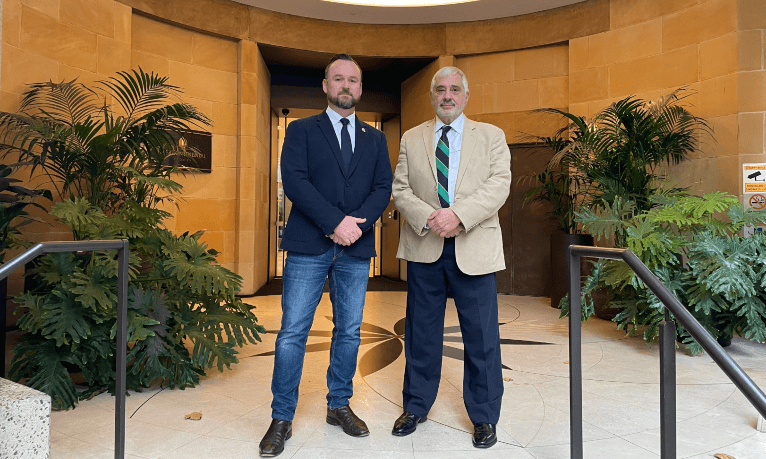Oliver Andrews: “A university degree, like the officers?”

Having suffered physically and emotionally after an Army training accident, Oliver Andrews discharged in 2018. Here, Oliver shares how he’s gotten to a point where he feels settled.
At a glance:
- Oliver Andrews joined the Reserves in 2009 and transferred to the regular Army in 2013.
- In 2015 a training accident blew out three vertebrae and left Oliver with a chronic back injury. He discharged in 2018.
- Oliver is now studying marketing and communications, and developing a veteran students’ union.
Transition for me was difficult because I had that mission-focused, goal-oriented military mindset. You know how it is – if something falls off, you just keep going. You’ll pick it up later.
Civilian life is nothing like that. It’s all about the individual rather than the collective.
Even jobs on the outside are all about what you can do and what value you can add, rather than what the team can do. This is one of the big culture shifts.
Another part of the challenge is that we’re doing a very unique job, defending Australia’s national interests. We form close bonds, no matter what service we’re in. Everyone in the ADF has a connection – we lose a lot of that when we get out. It’s quite daunting.
I joined the Reserves in 2009, deployed to the Solomon Islands for peacekeeping for five months, then transferred to the regular Army in 2013. In 2015 I was in a training accident and blew out three vertebrae – I could never get back to being fully fit. In 2018 I wasn’t getting better, and the culture in my Unit was very much ‘if you ain’t fit, you ain’t shit’.
I’d gone from being one of the top performers to not being able to do anything. I transitioned out. I didn’t have a choice, unfortunately. Then, my mental health got on top of me – depression and anxiety crept in.
At the same time, someone developing a coffee shop on base had the not-very-bright idea of staffing it with all of the ‘broken’ injured diggers. So we were stuck in this echo chamber of toxicity.
The long way out
In 2018 I was attached to the Soldier Recovery Centre in Adelaide. That was a bit of a saving grace. It offered respite from everything that had been going on, and through that I attended StoryRight, a one-day communication workshop that reminded me of my self-worth outside the Army. Thanks to that, when I got out I wasn’t too far off the beaten path, although I was still in a pretty dark place.
During my transition, there wasn’t that much support. In fact there wasn’t any. There was a two-day transition seminar, which is basically how to write a resume and get a Medicare card and pension entitlements if you’re medically discharged. That has since been revamped into a two-day job seminar.
There is ongoing support available, but it’s hard to find through the DVA. Some good programs like the peer-to-peer counselling through Open Arms can also go deeper into psychology and psychiatry services if needed.
There are also some scholarships for ongoing education. This is helping me through a marketing and communications degree, but that divide between officers and diggers is a barrier to university education for some diggers who think, ‘Why would we want to go and get a university degree, like the officers?’ Also, some diggers just don’t feel as if they’re good enough.
Three years since discharge
I finally feel a little bit settled, as if things should be okay.
My mental health is up and down, especially around ANZAC Day and other days of significance. I had a couple of mates who were killed in training, so ANZAC Day is a time to remember them.
Some difficulties come back to the loss of networks. When you’re in, you have really close bonds with all the guys around you. When you leave, a lot of times that’s broken. I was lucky that I discharged in the same place as I was posted so I didn’t lose that entirely. A lot of guys who moved back to where they came from completely lose that.
My physical health is about as good as can be expected. My back and its chronic pain is always going to be what it is. I just deal with that. I can just grit my teeth and get through it.
What would make all of this easier? That’s simple. I’d like to have access to a no-bullshit place where all the information is easily accessible. The fight for information, when I was getting out was ridiculous. Some sort of central portal or resource base with guidelines around what you need to do would greatly help.
Looking for somewhere to connect with veterans, and a central hub to access services and support in your community? Reach out to an RSL NSW sub-Branch near you.
If this article raises any issues for you, contact LifeLine, Open Arms or the Suicide Call Back Service.
- Open Arms 24-hour Support Line: 1800 011 046
- Lifeline 24/7 Crisis Support: 13 11 14
- Suicide Call Back Service: 1300 659 467
Catherine McGregor recently hosted a panel discussion with recent veterans about how they overcame challenges moving into new careers, new communities, new routines and more. Watch on demand: ‘Get moving in civilian life: tips from four recent veterans’.







